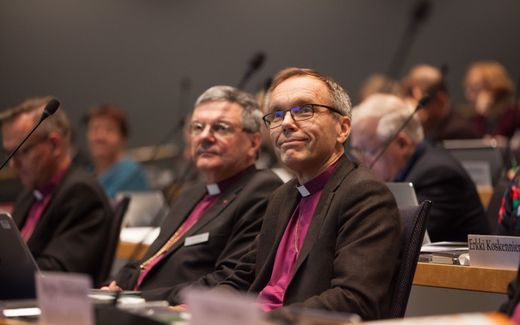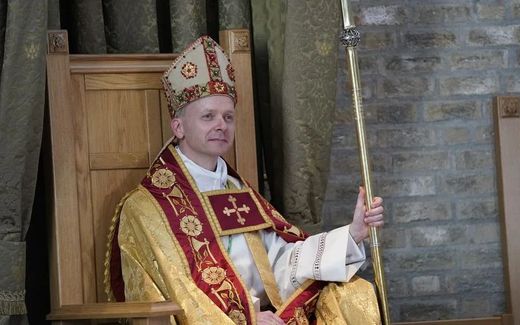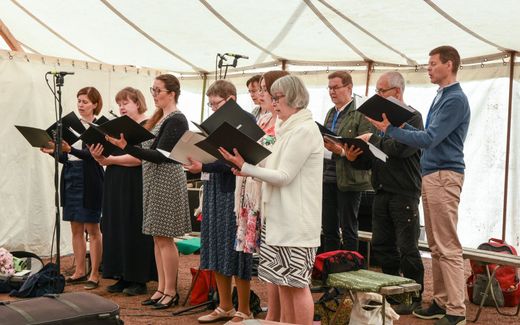Black smoke for second form of marriage in Finnish church

A wedding cake in Germany is decorated with the LGBT pride colours and figurines of two men and two women. Photo AFP, Tobias Schwarz
Northern Europe
While the world was watching the conclave in Rome, the Finnish church had another decisive meeting. The council of the Evangelical Lutheran Church decided not to redefine marriage.
Stay up to date with Christian news in Europe? Sign up for CNE's newsletter.
There was no three-quarters of support for a gender-neutral construction as a second form of marriage in the church.
Until a few decades ago, the Evangelical Lutheran Church of Finland maintained a clear biblical position condemning homosexuality. But the 60 per cent of leaders who voted in favour of same-sex marriage shows that things are changing. Even the highest authority of the Finnish Lutheran Church, Archbishop Tapio Luoma of Turku, is firmly in favour.
After last week's vote, he did not hesitate to declare: "I am convinced that, in time, the church will allow the marriage of same-sex couples in Finland as well." Even more illustrative of the situation, some of the most vocal reactions condemning the decision did not necessarily come from LGBT lobbyists, as one might have expected, but from within the church itself, such as, for example, the bishop of Mikkeli, Mari Parkkinen. (By the way, women can be ordained to such a position in Finland since 1988.)
How could so many leaders of the Lutheran Church end up holding such a supportive position? Here are some reasons regularly invoked by those within the church who claim that homosexuality is a normal way of life:
Only abuse
"The passages of Paul's epistles that seem to condemn homosexuality actually condemn only homosexual abuses, not mutual homosexual love."
This reason is undoubtedly the most cited. Those who defend this position believe that history pushes us to understand Paul's condemnation of homosexuality in this way.
In Paul's time, homosexuality was widely accepted in Roman society. Just like many Lutheran theologians today, this society believed that there was a difference between abusive homosexuality (rape) and consensual homosexuality. This idea was notably supported by the Greek philosopher Plato in his work Symposium. For him, abuse should be rejected while "love" should be encouraged.
It is one thing to say that Roman society distinguished between abusive and consenting homosexuality. It is totally different to say that Paul supported such a position.
If he indeed supported "homosexual love" over and against what "homosexual abuses", the church of his time should have had a population of same-sex couples. Yet, we can't find any trace of them. Could it be that the authors of the time tried to hide such a reality because of embarrassment? This is not plausible, since homosexuality was not taboo in Roman society.
The fact that we don't find homosexual couples in the church in a society where homosexuality was widely accepted seems to show that history does not speak in favour of the defenders of this practice.
Sodomite
"The Bible does not condemn homosexuality. The word 'homosexuality' does not even appear anywhere in the Bible."
Although this claim contradicts the first we explored, it is nonetheless advanced by some. The word "homosexuality" doesn't appear anywhere in the Bible simply because the term was not coined until the nineteenth century.
However, Paul uses the Greek term "arsenokoitain" in1 Timothy 1:10 and 1 Corinthians 6:9. This term, translated as "sodomite", takes us directly to Sodom and describes people having sexual relations with people of the same sex. Interestingly, God destroyed the entire city of Sodom because of such practices. As it seems, God didn't take into account the differences invoked by Plato and supported by several Lutheran dignitaries today.
Neither the Old nor the New Testament distinguishes between certain types of homosexual practices. This is interesting, particularly in the case of Paul, because he was usually very concerned about making such a distinction when necessary (for example, regarding consecrated meat). Moreover, if homosexuality, as mentioned in Romans 1, must be qualified, why not do the same about all the other vices mentioned in that same chapter, such as greed or even murder?
Relativism
"Claiming that the Bible condemns homosexuality is an interpretation like any other."
Here we come to the real root of the problem. The debate over homosexuality within the church is actually the visible part of an even more fundamental problem. Did God speak clearly? Did He reveal Himself clearly? Did He create man in His image, with the capacity to understand His revelation?
The relativistic position that all is a matter of personal interpretation is often advanced by those who, having run out of arguments, use it to discard their opponents' views. Ultimately, this means that God has not revealed Himself clearly, that His Word is not clear enough, and that He didn't create man with the capacity to understand what He says.
But if this were true, why do these same people want to force the redefinition of marriage to include same-sex couples? Aren't they pushing their relativistic interpretation at the expense of all others? As it appears, their relative views seem more valuable than those of their opponents.
Lack of love
"Condemning homosexuality is a lack of love for homosexuals."
Such a statement is often loudly expressed and has had the powerful effect of paralysing many of those who disagree. This has left the public space free to be occupied by the defenders of homosexuality. From a Christian perspective, the Bible is the Word of God, and it unequivocally announces that homosexuals (the sodomites) will not enter the Kingdom of God. Loving those who practice homosexuality certainly does not mean encouraging them to continue in their ways.
Homosexual attraction can be very powerful. As David N. Glesne shows in his study Understanding Homosexuality; Perspectives for the Local Church, such attraction can be up to ten times more powerful than a lustful attraction toward a person of the opposite sex. It is not surprising that many go so far as to believe that they were born that way and thus cannot change.
But true love does not tell them that this is true and that they are destined to continue like that. Love is about speaking the truth. It is about saying that God condemns such practices, but also that He sent His Son to set free those captive to sin (Luke 4:18).
However powerful homosexual attractions can be, the power of the Holy Spirit is yet infinitely bigger. Numerous Christians know that the Spirit is powerful enough to resist this attraction. The homosexual practice is a sin like any other, and Jesus is not too weak to free those held captive by it. People held captive by such a sin need a lot of compassion, but how will they be freed if the church tells them that God accepts their practice?
Related Articles










